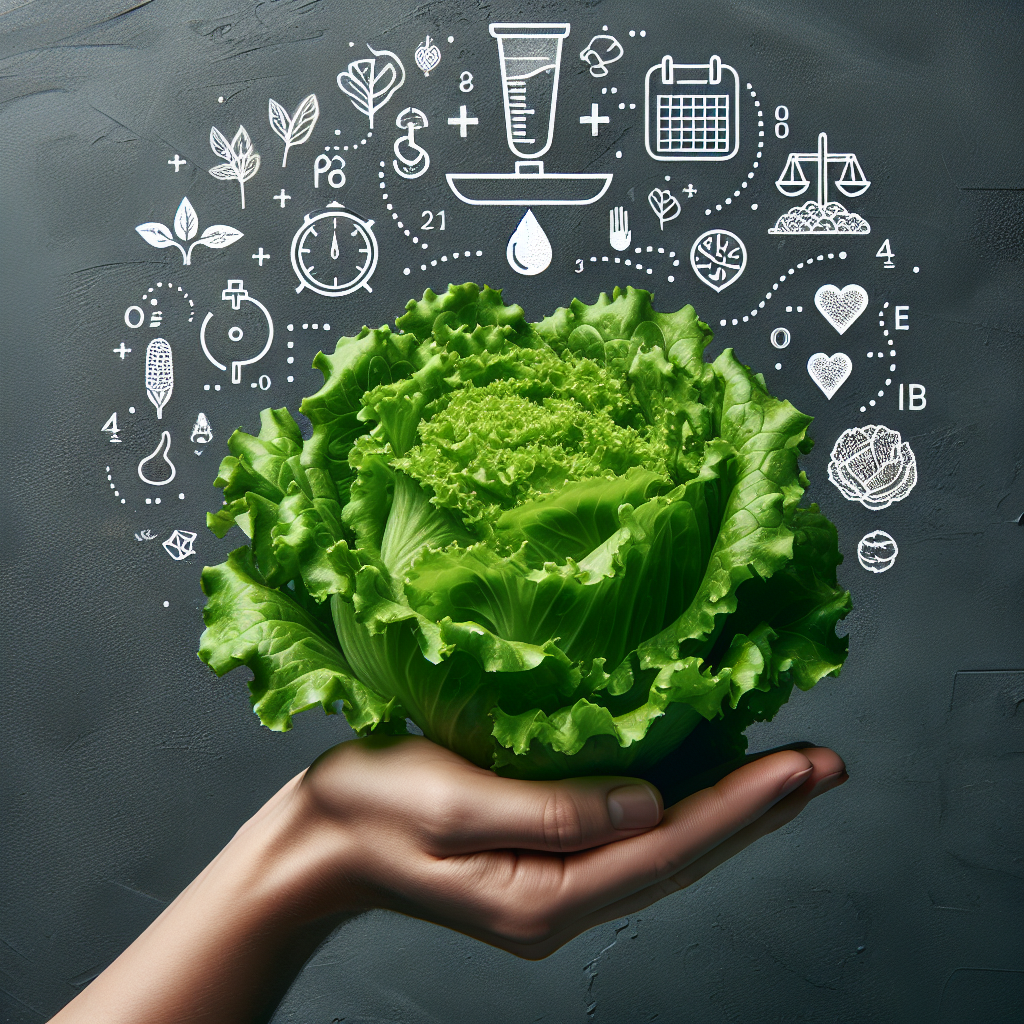Lettuce, often overlooked as just a humble salad ingredient, holds a surprising array of health benefits that cannot be ignored. From promoting good digestion to aiding in weight loss, lettuce packs a nutritious punch that will leave you feeling refreshed and energized. Whether you prefer the crisp crunch of romaine or the delicate leaves of butter lettuce, incorporating this leafy green into your diet is a simple yet effective way to improve your overall well-being. So, dive into the world of lettuce and unlock its incredible benefits for a healthier and happier you.

Nutritional Benefits
Lettuce is not just a leafy green vegetable that adds color and crunch to your meals; it also offers numerous nutritional benefits that can enhance your overall health and well-being. It is high in vitamins and minerals, making it a great addition to any diet. Lettuce is packed with essential nutrients such as vitamin A, vitamin K, folate, and potassium. These vitamins and minerals are crucial for maintaining a healthy immune system, promoting bone health, and supporting normal blood clotting.
High in Vitamins and Minerals
One of the main reasons why lettuce is considered a nutritional powerhouse is its high vitamin and mineral content. Vitamin A, for example, is important for vision, skin health, and the normal functioning of the immune system. Vitamin K is essential for blood clotting and maintaining bone health. Folate is crucial for pregnant women as it aids in baby’s development, while potassium plays a vital role in regulating blood pressure and maintaining proper heart function. By incorporating lettuce into your diet, you can easily boost your intake of these essential nutrients.
Rich in Antioxidants
Lettuce is also rich in antioxidants, which are compounds that help protect the body against damage from harmful free radicals. Free radicals can lead to chronic diseases such as heart disease, cancer, and aging-related conditions. Antioxidants, such as vitamin C and beta-carotene found in lettuce, help neutralize these free radicals, reducing the risk of such diseases. By including lettuce in your meals, you can take advantage of its antioxidant properties and support your body’s defenses against oxidative stress.
Low in Calories and Fat
If you’re looking to maintain a healthy weight or lose weight, lettuce is an excellent choice. It is low in calories and fat while being high in water content and fiber, making it a filling and satisfying option. By choosing lettuce as the base for your salads or as a replacement for higher-calorie ingredients in sandwiches and wraps, you can reduce your calorie intake without sacrificing flavor or nutrition. Additionally, the low-fat content in lettuce makes it a heart-healthy option for those concerned about their cholesterol levels and cardiovascular health.
Promotes Digestive Health
Good digestion is essential for overall well-being, and lettuce can play a significant role in promoting digestive health due to its high fiber and water content.
High Fiber Content
Lettuce is an excellent source of dietary fiber, which is essential for maintaining healthy digestion. Fiber adds bulk to your stool, making it easier to pass through your digestive tract and preventing constipation. It also helps regulate bowel movements and reduces the risk of developing hemorrhoids. Including lettuce in your diet can provide a significant amount of fiber, ensuring that your digestive system stays healthy and regular.
Water Content Aid in Digestion
Lettuce’s high water content can also aid in digestion. Water plays a crucial role in maintaining the balance of fluids in your body and avoiding dehydration, which can lead to constipation and other digestive issues. When you consume lettuce, the water content helps soften the stool, making it easier to pass. Additionally, water can help break down food and facilitate the absorption of nutrients during digestion. By enjoying lettuce as part of your meals, you can keep your digestive system hydrated and functioning optimally.
Beneficial for Constipation
If you struggle with constipation, incorporating lettuce into your diet can be incredibly beneficial. The high fiber and water content in lettuce add bulk to your stool, making it easier to pass through your digestive tract. The fiber acts as a natural laxative, promoting regular bowel movements and alleviating constipation symptoms. By including lettuce in your meals, you can support your digestive health and reduce the discomfort associated with constipation.

Boosts Immune System
Maintaining a strong immune system is essential for fighting off illnesses and keeping your body healthy. Lettuce can be a significant contributor to your immune health due to its vitamin C content and phytonutrients.
Source of Vitamin C
Vitamin C is a powerful antioxidant that supports the immune system. It helps stimulate the production of white blood cells, which are crucial for fighting off infections and diseases. Lettuce is a good source of vitamin C, and including it in your diet can help boost your body’s defenses and enhance your immune response. It’s worth noting that vitamin C is not stored in the body, so regular consumption of lettuce and other vitamin C-rich foods is necessary for reaping its immune-boosting benefits.
Contains Phytonutrients
Lettuce contains various phytonutrients, which are compounds found in plants that have been shown to have numerous health benefits. These phytonutrients, such as flavonoids, carotenoids, and phenolic compounds, have antioxidant and anti-inflammatory properties that can support your immune system. Antioxidants help protect the body against oxidative stress, reduce inflammation, and promote overall well-being. By including lettuce in your diet, you can benefit from these phytonutrients and give your immune system the support it needs to stay strong and healthy.
Helps Reduce Inflammation
Chronic inflammation is linked to numerous health conditions, including heart disease, cancer, and autoimmune disorders. Lettuce’s phytonutrients, particularly its flavonoids and phenolic compounds, have anti-inflammatory properties that can help reduce inflammation in the body. By incorporating lettuce into your meals, you can reduce the risk of chronic inflammation and its associated health problems. Supporting your immune system and reducing inflammation can help keep your body healthy and functioning at its best.
Supports Heart Health
Maintaining heart health is crucial for overall well-being, and lettuce can be a valuable addition to a heart-healthy diet due to its potassium content, ability to promote healthy cholesterol levels, and its nitrate content.
High in Potassium
Potassium is an essential mineral that plays a crucial role in maintaining heart health. It helps regulate blood pressure, supports proper heart rhythm, and facilitates muscle contractions. Lettuce is a good source of potassium, and by including it in your diet, you can help ensure that your body has an adequate supply of this important mineral for optimal heart function.
Promotes Healthy Cholesterol Levels
High levels of cholesterol, particularly LDL cholesterol, can increase the risk of heart disease. Lettuce can help promote healthy cholesterol levels due to its low-fat content and high fiber content. The fiber in lettuce can help reduce LDL cholesterol levels by binding to it in the digestive tract and preventing its absorption into the bloodstream. Additionally, the low-fat nature of lettuce makes it a heart-healthy choice for those concerned about their cholesterol levels.
Contains Nitrate for Blood Pressure
Nitrates are naturally occurring compounds found in certain vegetables, including lettuce. These compounds have been shown to have a positive impact on blood pressure by helping relax and dilate blood vessels. By consuming lettuce, you can increase your intake of nitrates, which can help lower blood pressure levels and reduce the risk of hypertension. Maintaining healthy blood pressure is essential for heart health, making lettuce a valuable addition to a heart-healthy diet.

Promotes Healthy Weight Management
Maintaining a healthy weight is important for overall health and well-being, and lettuce can be a valuable ally in achieving your weight loss or weight management goals.
Low-Calorie Option
Lettuce is incredibly low in calories, making it an excellent choice for those looking to reduce their calorie intake. By replacing higher-calorie ingredients in your meals with lettuce, such as using lettuce wraps instead of bread or using lettuce as the base for your salads, you can still enjoy a satisfying and flavorful meal while keeping your calorie intake in check. Additionally, the high water content in lettuce can contribute to a feeling of fullness, reducing the likelihood of overeating.
High Fiber Content Provides Satiety
The high fiber content in lettuce provides a feeling of satiety, helping you feel fuller for longer after meals. Fiber adds bulk to your diet, slows down the digestion process, and contributes to feelings of fullness. By including lettuce in your meals, you can increase your fiber intake, which can help prevent overeating and support your weight management goals. Lettuce’s low-calorie and high-fiber combination makes it an ideal choice for those looking to maintain a healthy weight.
Supports Weight Loss Goals
If you’re trying to lose weight, lettuce can be a helpful addition to your diet. Its low-calorie content, filling fiber, and high water content make it a satisfying choice that can help you stay on track with your weight loss goals. By incorporating lettuce into your meals, you can reduce your overall calorie intake while still enjoying a variety of flavorful and nutritious options. Whether as a side dish, a salad base, or a replacement for higher-calorie ingredients, lettuce can support your weight loss journey.
Enhances Eye Health
Maintaining healthy eyes and good vision is essential at every stage of life, and lettuce can help support eye health due to its rich sources of beta-carotene, lutein, and zeaxanthin.
Rich Source of Beta-Carotene
Beta-carotene is a precursor to vitamin A, which is crucial for maintaining healthy eyes and good vision. The body converts beta-carotene into vitamin A, which is required for the proper functioning of the retina and the prevention of conditions such as night blindness. Lettuce is a rich source of beta-carotene, and including it in your diet can contribute to your daily intake of this important nutrient, supporting your eye health.
Contains Lutein and Zeaxanthin
Lettuce is also a good source of lutein and zeaxanthin, two carotenoids that are known for their beneficial effects on eye health. These compounds act as antioxidants and are found in high concentrations in the macula of the eye. They help filter harmful high-energy blue light and protect the retina from oxidative damage. By including lettuce in your diet, you can increase your intake of lutein and zeaxanthin, reducing the risk of age-related macular degeneration and promoting optimal eye health.
Reduces Risk of Age-Related Macular Degeneration
Age-related macular degeneration (AMD) is a leading cause of vision loss in older adults. The antioxidants and carotenoids found in lettuce, such as lutein, zeaxanthin, and beta-carotene, have been shown to reduce the risk of developing AMD and slow its progression. By regularly consuming lettuce as part of a balanced diet, you can provide your eyes with the necessary nutrients to support their health and potentially reduce the risk of age-related vision problems.

Natural Hydration
Staying hydrated is essential for overall health and well-being, and lettuce can contribute to your hydration due to its high water content.
High Water Content
Lettuce has a high water content, which can contribute to your daily fluid intake and keep you hydrated. Proper hydration is crucial for maintaining the balance of bodily fluids, regulating body temperature, and supporting various functions such as digestion, circulation, and nutrient absorption. By including lettuce in your meals, you can add a hydrating element to your diet and support your overall hydration levels.
Hydrates the Body
The water content in lettuce not only contributes to overall hydration but also helps keep your body hydrated at a cellular level. Water is essential for numerous bodily functions, including maintaining optimal organ function, lubricating joints, and facilitating nutrient transport. By consuming lettuce, you can hydrate your body effectively and promote its proper functioning. It’s worth noting that while lettuce can contribute to hydration, it should not replace the need for drinking an adequate amount of water throughout the day.
Contributes to Healthy Skin
Proper hydration is essential for maintaining healthy skin, and lettuce can play a role in supporting skin health due to its water content. When your body is well-hydrated, your skin is better able to maintain its elasticity, prevent dryness, and reduce the appearance of wrinkles. Including lettuce in your diet can help contribute to your daily fluid intake, supporting skin hydration and overall skin health. Hydrated skin is more supple, radiant, and less prone to common skin issues such as dryness and flakiness.
Reduces Risk of Chronic Diseases
Chronic diseases such as heart disease, type 2 diabetes, and certain types of cancer are a significant concern for many individuals. Lettuce can help reduce the risk of these diseases due to its various properties and nutrient content.
May Lower Risk of Type 2 Diabetes
Type 2 diabetes is a chronic condition characterized by high blood sugar levels and insulin resistance. A diet rich in leafy green vegetables like lettuce has been associated with a lower risk of developing type 2 diabetes. Lettuce’s low-calorie and low-glycemic index nature, combined with its fiber content, can help regulate blood sugar levels and reduce the risk of insulin resistance. By incorporating lettuce into your diet, you can support your overall health and potentially reduce the risk of developing type 2 diabetes.
Protects against Cancer
Cancer is a complex disease influenced by various factors, including diet. Consuming a diet rich in fruits and vegetables, including lettuce, has been associated with a reduced risk of certain types of cancer. Lettuce’s high antioxidant content, including its beta-carotene and phytonutrients, helps neutralize harmful free radicals, which are known to contribute to the development of cancer cells. By including lettuce in your meals, you can provide your body with valuable antioxidants and potentially reduce the risk of cancer.
Alleviates Inflammation
Chronic inflammation is a common feature of many chronic diseases, including heart disease, diabetes, and cancer. Lettuce’s phytonutrients, such as flavonoids and phenolic compounds, have anti-inflammatory properties that can help alleviate chronic inflammation in the body. By regularly consuming lettuce, you can support your body’s natural anti-inflammatory mechanisms and potentially reduce the risk of chronic diseases associated with inflammation. A balanced and varied diet that includes lettuce can be a valuable tool in maintaining overall health and well-being.

Beneficial for Pregnancy
Pregnancy is a crucial time when proper nutrition is essential for both the expectant mother and the developing baby. Lettuce can be a valuable addition to a pregnancy diet due to its folate, iron, and calcium content.
Source of Folate
Folate, also known as vitamin B9, is a crucial nutrient during pregnancy as it plays a vital role in the development of the baby’s neural tube, which eventually forms the brain and spinal cord. Adequate folate intake during pregnancy can help reduce the risk of neural tube defects such as spina bifida. Lettuce is a good source of folate, making it an excellent choice for pregnant women who need to increase their intake of this essential nutrient.
Provides Iron and Calcium
Iron and calcium are two minerals that are particularly important during pregnancy. Iron is needed to support the increased blood volume and prevent iron deficiency anemia, which is common during pregnancy. Calcium is essential for the proper development of the baby’s bones and teeth. Lettuce can be a valuable source of these minerals, providing pregnant women with the nutrients they need to support the healthy development of their baby.
Promotes Baby’s Development
A well-balanced diet that includes lettuce can provide pregnant women with essential nutrients to support the development of their baby. The folate, iron, and calcium content in lettuce are crucial for the healthy development of the baby’s brain, spine, blood, and bones. By incorporating lettuce into their diet, expectant mothers can ensure that they are providing their bodies and their growing baby with the necessary nutrients for optimal development.
Versatile Ingredient
Lettuce is a versatile ingredient that can be used in a variety of dishes, making it a valuable addition to any kitchen.
Suitable for Various Dishes
Lettuce is a versatile vegetable that can be used in numerous dishes. From classic salads to wraps, sandwiches, soups, and stir-fries, lettuce can add flavor, crunch, and nutritional value to a wide range of meals. Its mild flavor pairs well with various other ingredients, allowing you to get creative in the kitchen and experiment with different flavor combinations. Whether you prefer romaine, iceberg, butterhead, or leaf lettuce, there is a lettuce variety suitable for any dish you wish to prepare.
Can Be Eaten Raw or Cooked
One of the great things about lettuce is its versatility in how it can be enjoyed. It can be consumed raw in salads, sandwiches, and wraps, providing a refreshing and crispy texture. The crispness of lettuce makes it a popular choice for adding a satisfying crunch to dishes. Lettuce can also be cooked in various ways, such as sautéing, braising, or grilling. Cooked lettuce takes on a milder and softer texture while still retaining its nutritional benefits. The ability to enjoy lettuce raw or cooked gives you flexibility in incorporating this nutritious ingredient into your meals.
Adds Texture and Flavor to Meals
Lettuce not only adds nutrition to your meals but also contributes texture and flavor. Its crunchy texture provides a satisfying mouthfeel, while its mild and refreshing flavor can complement a wide variety of ingredients. Lettuce can add a refreshing and crisp element to sandwiches and wraps, a vibrant and colorful base to salads, or a nutritious addition to stir-fries and soups. Whether you’re looking to elevate the taste and texture of your meals or add a healthy element to your cooking, lettuce is an ingredient that can enhance your culinary creations.
In conclusion, lettuce offers a multitude of nutritional benefits that can contribute to your overall health and well-being. From its high vitamin and mineral content to its antioxidant properties and low-calorie nature, lettuce is a versatile vegetable that can enhance your diet in numerous ways. Its support for digestive health, immune system, heart health, weight management, eye health, hydration, and reduction of chronic disease risks, make it a valuable addition to any meal plan. Whether enjoyed raw or cooked, lettuce can enrich the flavor, texture, and nutrition of your dishes. So, why not incorporate lettuce into your meals and experience all the benefits it has to offer? Your body will thank you!

